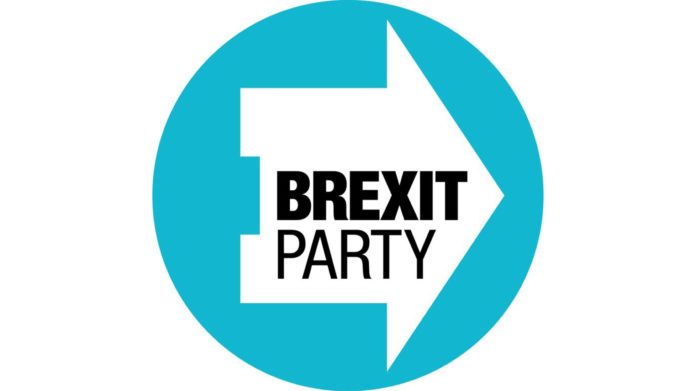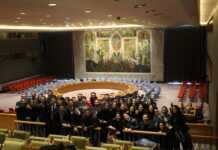
Yosef David will represent the Brexit Party in Islington North against Labour leader Jeremy Corbyn in the general election. But with the opposition leader holding a 40,000 plus majority this is a monumental challenge facing the rookie candidate.
An orthodox Jew, David is a social worker for a Jewish charity in Hendon and was due to stand in his workplace against Conservative’s Matthew Offord MP but that changed when Brexit leader Nigel Farage announced candidates would not contest seats held by 317 Tory MPs earlier this week.
David, who grew up just down the road in Golders Green and attended Hasmonean High School followed by a gap year in Israel, has a daunting task as Corbyn increased his majority by 10,430 votes at the last snap election, gaining 40,086 votes.
The Conservatives won 6,871 votes, Lib Dems 4,946 and Greens 2,229 votes.
With the Brexit Party searching for someone from the Jewish community to stand against Corbyn as it would be a chance to highlight the anti-Semitism crisis, David spotted and got his opportunity after Farage’s announcement.
“I’m honoured the Party has chosen me but with his majority it would be a miracle to take the seat,” David noted. “But I’ll use the platform to speak about Brexit and the British Jewish community.
“Our community has been suffering from a rise in anti-Semitism and he (Corbyn) has been leader of the Party during that rise. He has responsibility on how the crisis has been handled.”
David added, “He’s very articulate and a great debater. It will not be a walk in the park in terms of a debate, but I’m doing it not just for Jews, the people of Islington North and Brexit, but anyone who stands for decency and for minority communities to be protected. Any minority community that feels scared you try to empathise with and I have not seen that coming from the Labour Party.”
In terms of anti-Semitism, what are David’s feelings about Corbyn on this ongoing issue within Labour.
“As far as he (Corbyn) is concerned, he is not an anti-Semite, but my feeling is that he does not understand what anti-Semitism is,” explained David. “If he could empathise with us, put himself in our shoes, try and experience what it feels like to be a minority community with the history that we have, with the fears that we have in our psyche, not just with regard to what actually happens on the streets but with regard to what happened in our past, then he would react differently.
“He (Corbyn) has consistently failed to empathise with our community; he has had numerous opportunities and has not done it. I haven’t seen any evidence of him trying to fight anti-Semitism with the ferocity that he could. For him it’s a crisis of empathy. If he fully understood the impact that his party, and stance he has taken, has had on our community he would oppose it.”
David would not label Corbyn anti-Semitic unlike numerous politicians and community leaders but was critical of the Labour leader’s actions and Party in particular.
“From what I have seen of him in the media and the way he has handled the crisis there are things where I would say, that was anti-Semitic, such as the (‘Freedom for Humanity’) mural, but he has not come out and made an overtly anti-Semitic comment,” noted David. “But he does keep rubbing shoulders with it. He also seems to have a lot of time for people who hate us and have a huge amount of animosity for our community. People may disagree, but he has allowed anti-Semitism to flourish, he’s allowed it to take root in his Party.
“Labour as a Party is institutionally anti-Semitic. The frustration of their procedures to root out anti-Semites has been consistently bad. Members are only kicked out when they have had no choice. And if we look at the adoption of IHRA, it has been done ungraciously.”
Turning to the Brexit leader, David first heard Farage deliver a speech at Hasmonean High School.
“I found him to be open as well as empathic with regard to the concerns of the community,” he recalled.
“I have followed Nigel for some time and found him to be a true friend of the Jewish community and Israel. He has never held back defending Israel from disproportionate negative attacks in the media or from fighting for fundamental Jewish beliefs such as shechita in the European Parliament.”
David added, “Nigel associates with many Jews and believes in promoting the same kind of family values and social attitudes that we as Jews live by.”
In terms of the December poll, David noted Farage had made the correct call in not standing candidates against Tory MPs.
“He’s put country before Party,” he explained. “It was obviously a very difficult decision but he has done what he feels is right in regards to getting Brexit done.
“It will be one of the most interesting elections ever. Nigel has taken the decision to avoid a hung parliament and to see Brexit through, that’s the most important thing.”
There is also pressure for Brexit not to stand in constituencies where Labour hold a thin majority.
“There are seats where Tories have no chance of winning based on community and political tradition.” David responded. “People don’t vote Tory in some places so we can take those seats. If Parties want to make compromises like we have done I’m sure Nigel will be open to talking to them.”
So why is David standing for the Brexit Party?
“I have followed Eurosceptic politics and politics in general for a long time,” he said. “As an orthodox person I feel it is imperative to show Hacarat Hatov (recognising the good) for a country that has given my family and millions of other descendants of immigrants the equal opportunity to strive for success.
“After the referendum, people of this country needed support as their democratic decision had been ignored by the powered elite. The Brexit Party could support the people of this country. It is also truly representative of modern Britain. There are candidates from all races and religions occupying positions in the party.”
David continued, “I want our politicians to be elected by us and for them to know we can remove them if they don’t serve our best interests. Our Parliamentarians have a responsibility to return parliamentary power in full to the people at every election. And we have not done that. We have signed it away. With every new law passed we cede more power to the European Union.
“I believe in Great Britain. This is an amazing country. People can succeed irrespective of their background if they are committed. The time for us to believe in our country is now. We were a pluralist nation way before we joined the EU. We don’t need the EU to tell us how be a pluralist nation.”
He added, “It seems obvious that a large government that spans a continent and has a population of 500 plus million will be less able to intimately advocate for its population than an independent sovereign nation of 67 million. Issues such as brit mila and shechita fundamental to our culture and observance, as well as our continued existence as a people are far more difficult to protect in the nihilistic EU than in the UK.”
Aside from the £39 billion Brexit divorce bill, David noted Brexit policies included changes to inheritance tax, foreign aid budget, HS2 and business tax but two issues stood out.
“For me it’s become a Brexit and anti-Semitism election,” he said. “That is the platform I am going to stand on and I see it as a responsibility to highlight the fear that is in the community.”
Looking ahead, he noted, “Our flagship policy after Brexit is electoral reform. We want to change the way we elect parliamentarians and bring in some form of proportional representation which would end the two-party system. We want realistic, genuine options on the ballot paper people can choose from. It would be a very different House of Commons and you could do away with career politicians who frankly have contempt for the electorate.
“After the election we need to be there to advocate, to give Britain a chance to find its feet. We need to make sure the abuse of parliamentary power never happens again.”
David concluded, “I’d like to cut into his (Corbyn’s) vote significantly. I’m looking forward to representing the British Jewish community and representing the pluralist, outward looking face of Brexit.”









